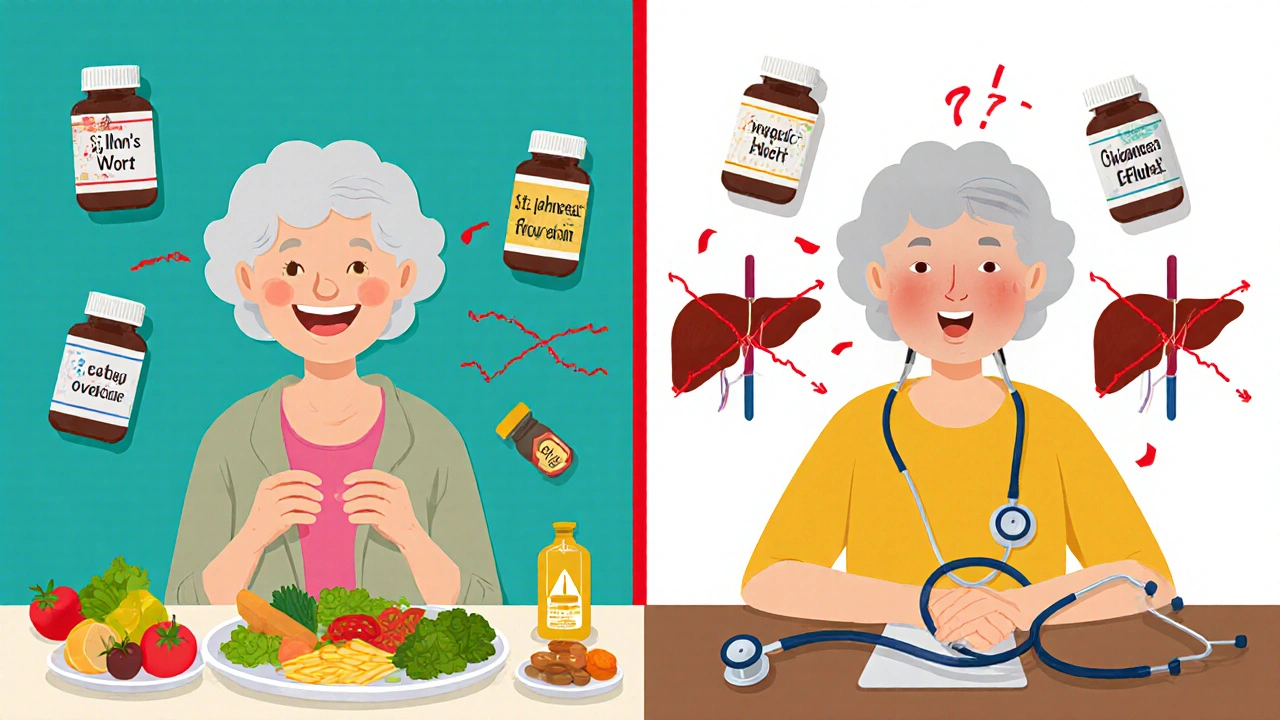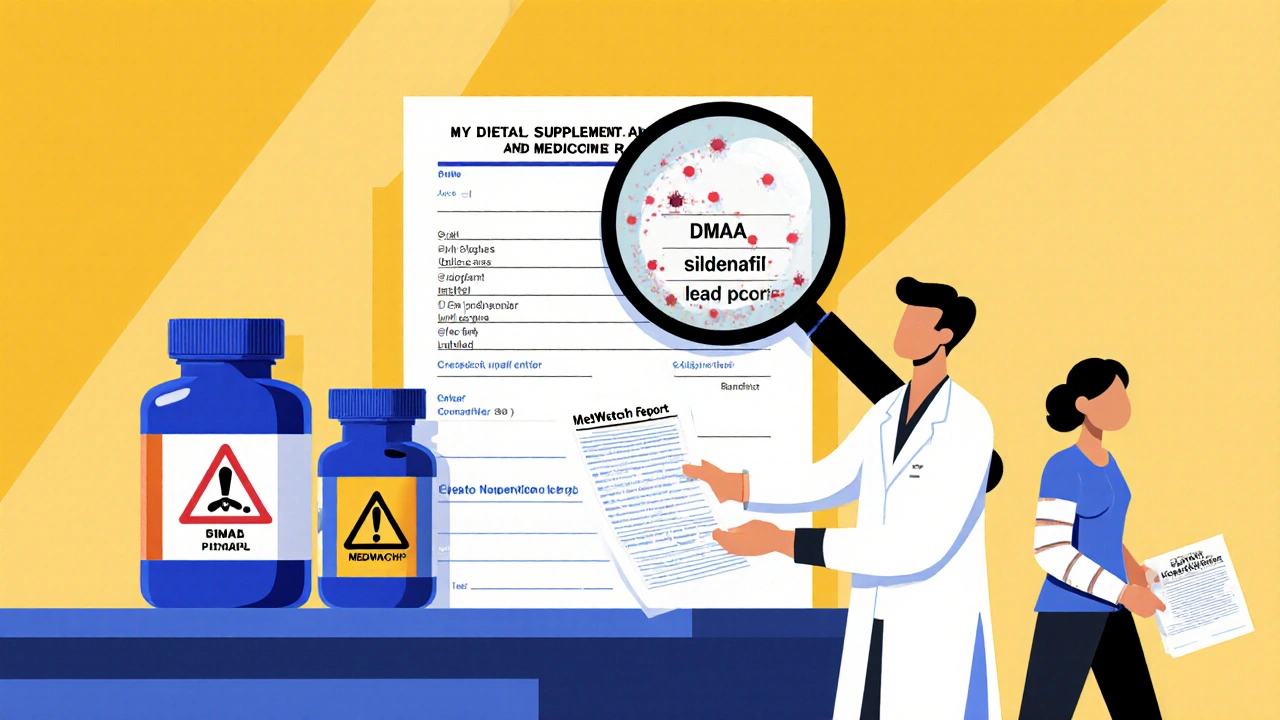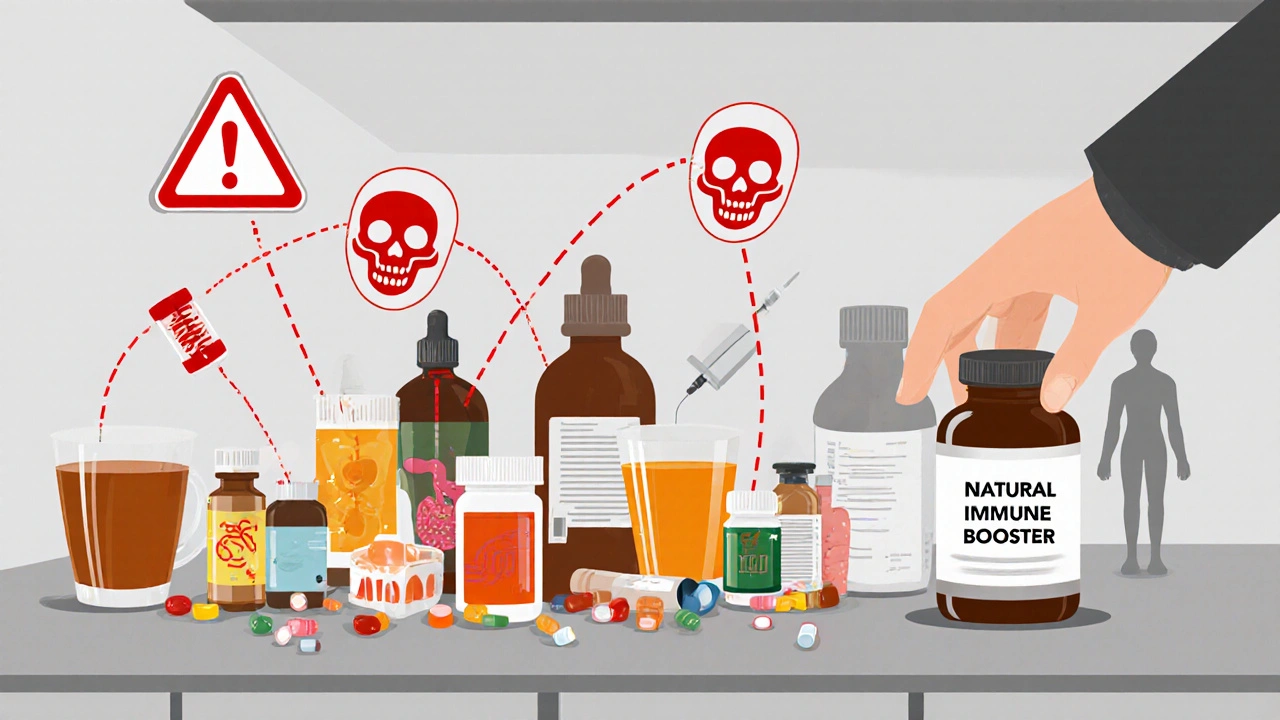People take medications and dietary supplements every day to feel better, manage chronic conditions, or boost energy. But many don’t realize that medication risks aren’t limited to prescriptions - over-the-counter pills, herbal teas, and vitamin bottles can be just as dangerous when mixed with other substances. The idea that ‘natural’ means ‘safe’ is one of the most dangerous myths in health today. In reality, supplements can cause serious harm - even death - especially when used without knowing how they interact with your other medicines.
Supplements Aren’t Regulated Like Drugs
Unlike prescription medications, which must prove safety and effectiveness before hitting the market, dietary supplements are treated like food by the FDA. That means companies don’t need to show their products work or are safe before selling them. The Dietary Supplement Health and Education Act (DSHEA) of 1994 gave manufacturers this freedom. The FDA can only act after someone gets hurt - and even then, the process is slow. Between 1994 and 2025, the FDA has banned just 12 supplement ingredients out of more than 85,000 products available in the U.S. That’s less than one per year.
What does this mean for you? A bottle labeled “natural immune booster” might contain hidden stimulants, unlisted pharmaceuticals, or toxic levels of vitamins. In 2022, the FDA received over 5,000 adverse event reports linked to supplements - and experts say that’s only about 1% of actual incidents. Most people never report problems. If you feel weird after starting a new pill, don’t assume it’s just your body “adjusting.” It could be poisoning.
Hidden Interactions Can Kill
The biggest danger isn’t taking one supplement alone - it’s mixing it with your regular meds. Many supplements directly interfere with how drugs work in your body. One of the most dangerous examples is St. John’s wort, a popular herb for mood support. It can cut the effectiveness of birth control pills by 15%, raise the risk of unplanned pregnancy, and drop levels of cyclosporine - a drug transplant patients rely on to keep their bodies from rejecting new organs - by up to 60%. That’s not a small drop. It’s life-threatening.
Other common offenders:
- Goldenseal - reduces how well your body absorbs antibiotics and heart medications.
- Ginkgo biloba - increases bleeding risk when taken with aspirin, warfarin, or even ibuprofen. One woman was hospitalized after combining it with daily aspirin - she bled internally and needed a blood transfusion.
- Garlic supplements - can double bleeding time during surgery. Surgeons often tell patients to stop them two weeks before any procedure.
- Fish oil - while good for heart health, high doses (over 3,000 mg daily) can thin blood too much, especially when paired with anticoagulants.
Even something as simple as vitamin K can ruin your warfarin treatment. Warfarin works by blocking vitamin K to prevent clots. If you start taking a multivitamin with vitamin K or eating more leafy greens, your blood can suddenly clot - leading to stroke or heart attack. Your INR level (a blood test that measures clotting time) can swing wildly without you knowing why.
Too Much of a Good Thing
It’s easy to think more vitamins = better health. But that’s not true. Vitamins are not candy. They’re powerful chemicals your body uses in precise amounts.
Vitamin A - Taking more than 10,000 IU daily for months can cause liver damage, blurred vision, and peeling skin. A single dose over 300,000 IU can trigger acute toxicity: nausea, dizziness, and even increased pressure in the brain.
Vitamin D - Often promoted for bone health, but high doses (over 300,000 IU per month) increase fall and fracture risk in older adults. Too much vitamin D raises calcium levels in your blood, which can lead to kidney stones, heart rhythm problems, and even coma.
Vitamin E - At doses above 400 IU per day, it increases the risk of hemorrhagic stroke by 10%. That’s not theoretical - a 2021 study of 35,000 adults found this link clearly.
And don’t forget about herbal products. Green tea extract, marketed for weight loss and antioxidant benefits, is now the second most common cause of supplement-related liver injury in the U.S. - after kava. The LiverTox database, maintained by the NIH, now lists 45 supplement ingredients linked to liver damage. Many people don’t realize they’re taking it - it’s hidden in energy drinks, fat-burners, and “detox” teas.

Supplements and Cancer Treatment Don’t Mix
If you’re undergoing chemotherapy, radiation, or immunotherapy, the risks multiply. Antioxidants like vitamins C and E are often taken to “protect” the body - but they can shield cancer cells from the damage these treatments are designed to cause. Studies show they can reduce chemotherapy effectiveness by 25-30% in certain cancers.
Dr. Ryan T. Lee, a radiation oncologist at Memorial Sloan Kettering, says patients who take supplements during treatment often develop severe skin reactions - burns, blisters, and delayed healing - that force doctors to pause therapy for weeks. One patient had to delay radiation for 18 days after taking vitamin E supplements. That delay can mean the difference between remission and recurrence.
The American Cancer Society’s official advice? Avoid all dietary supplements during cancer treatment unless your oncologist says otherwise. And even then, only use ones with proven safety data - which is rare.
What You Might Not Know About Your Supplements
Many supplements contain ingredients that aren’t listed on the label. In 2023, the FDA found that 30% of weight-loss supplements contained hidden stimulants like synephrine or DMAA - banned substances linked to heart attacks and strokes. Others were laced with prescription drugs like sildenafil (Viagra) or steroids.
Online purchases are the biggest risk. Nearly half of all supplement-related adverse events come from products bought on Amazon, eBay, or shady websites. These sellers don’t follow FDA guidelines. They don’t test for purity. They don’t care if you get sick - as long as you keep buying.
Even “trusted” brands aren’t always safe. In 2022, a popular multivitamin brand was recalled after tests found lead levels 10 times higher than the legal limit. The company claimed it was “contamination” - but the same issue had happened before.

Who’s at Highest Risk?
Older adults are the most vulnerable. They’re more likely to take multiple medications and supplements. Their livers and kidneys don’t process chemicals as efficiently. A 70-year-old woman on blood pressure meds who starts taking bitter orange for weight loss could see her systolic pressure spike by 15 mmHg - enough to trigger a heart attack.
People with chronic illnesses - diabetes, kidney disease, heart failure - are also at greater risk. Their bodies are already under stress. Adding a supplement can tip them into crisis.
And then there’s the silent problem: no one talks about it. Only 33% of adults tell their doctor what supplements they’re taking. Why? Because doctors rarely ask. Patients assume it’s not important. That’s a deadly assumption.
How to Protect Yourself
You don’t have to give up supplements entirely - but you need to treat them like medicine. Here’s how:
- Make a complete list - Write down every pill, powder, tea, or drop you take daily, including dosage and frequency. Include over-the-counter meds, herbal remedies, and vitamins.
- Bring it to every appointment - Show your doctor and pharmacist every time. Don’t assume they’ll remember. Use the NIH’s free “My Dietary Supplement and Medicine Record” form - it’s used in over 1,200 clinics nationwide.
- Ask two questions - “Could this interact with any of my other meds?” and “Is there any research showing this is safe for someone with my condition?”
- Stop anything that causes weird symptoms - Heart palpitations, rashes, dizziness, trouble breathing, or unexplained bruising? Stop the supplement immediately and call your doctor.
- Report bad experiences - Use the FDA’s MedWatch system. Even one report helps. In 2022, they processed over 18,000 supplement-related reports - and that’s just what people bothered to file.
And if you’re thinking about starting something new - especially for sleep, anxiety, energy, or weight loss - pause. Talk to someone who’s trained to understand drug interactions. Not a YouTube influencer. Not a supplement store clerk. A pharmacist or your primary care provider.
The Bottom Line
There’s no such thing as a risk-free supplement. Every pill you swallow has biological effects - and those effects can clash with your body, your meds, or your health goals. The supplement industry makes billions selling the idea that you need more, faster, better. But your health isn’t a product you can upgrade. It’s a system that works best when you don’t mess with it unnecessarily.
If you’re healthy and eating a balanced diet, most supplements do nothing for you - except cost money and create hidden risks. If you’re managing a condition, they can be dangerous. Always assume the worst until proven otherwise. And never, ever take a supplement without telling your doctor.
Can dietary supplements cause liver damage?
Yes. The NIH’s LiverTox database tracks 45 supplement ingredients linked to liver injury. Green tea extract is the second most common cause, responsible for 22% of cases. Other offenders include kava, usnic acid (found in weight-loss pills), and high-dose vitamin A. Symptoms include yellowing skin, dark urine, fatigue, and abdominal pain. If you’re taking any herbal supplements and notice these signs, stop immediately and get tested.
Are natural supplements safer than prescription drugs?
No. The word “natural” doesn’t mean safe. Many prescription drugs are derived from plants - digoxin from foxglove, morphine from poppies. The difference is that prescription drugs go through years of testing for dosage, side effects, and interactions. Supplements don’t. A plant extract can be more toxic than a synthetic drug if the dose isn’t controlled. Bitter orange, for example, contains synephrine - a stimulant linked to heart attacks - and it’s sold as a “natural” weight-loss aid.
Why don’t doctors always know about supplement risks?
Most medical schools teach little about supplements. A 2021 survey found that only 12% of U.S. medical schools include a dedicated module on dietary supplement interactions. Doctors are trained to recognize drug side effects, not herbal ones. Plus, many patients don’t mention supplements - they think they’re harmless. That’s why it’s up to you to bring up your supplement use, not wait for your doctor to ask.
Can I take supplements while on antibiotics?
Some can interfere. Goldenseal, for example, can reduce the absorption of antibiotics like doxycycline and ciprofloxacin. Probiotics may help restore gut flora after antibiotics, but they should be taken at least two hours apart. Always check with your pharmacist before combining any supplement with antibiotics - even something as simple as calcium or iron can bind to antibiotics and stop them from working.
What should I do if I think a supplement is making me sick?
Stop taking it right away. Contact your doctor or go to urgent care if you have symptoms like chest pain, difficulty breathing, swelling, severe rash, or confusion. Then report it to the FDA through MedWatch Online. Even if you’re not sure it was the supplement, report it. These reports help the FDA identify dangerous products. If you have the bottle, keep it - the label may help investigators identify harmful ingredients.
Are there any supplements that are generally safe?
For most healthy adults, low-dose multivitamins and vitamin D (if deficient) are generally low-risk. But “low-risk” doesn’t mean “no risk.” Even these can cause problems if you have kidney disease, are on blood thinners, or take high doses. The safest approach is to get nutrients from food. Supplements should only fill gaps - not replace a healthy diet. If you’re unsure, ask your doctor to run a blood test before starting anything.


Post A Comment